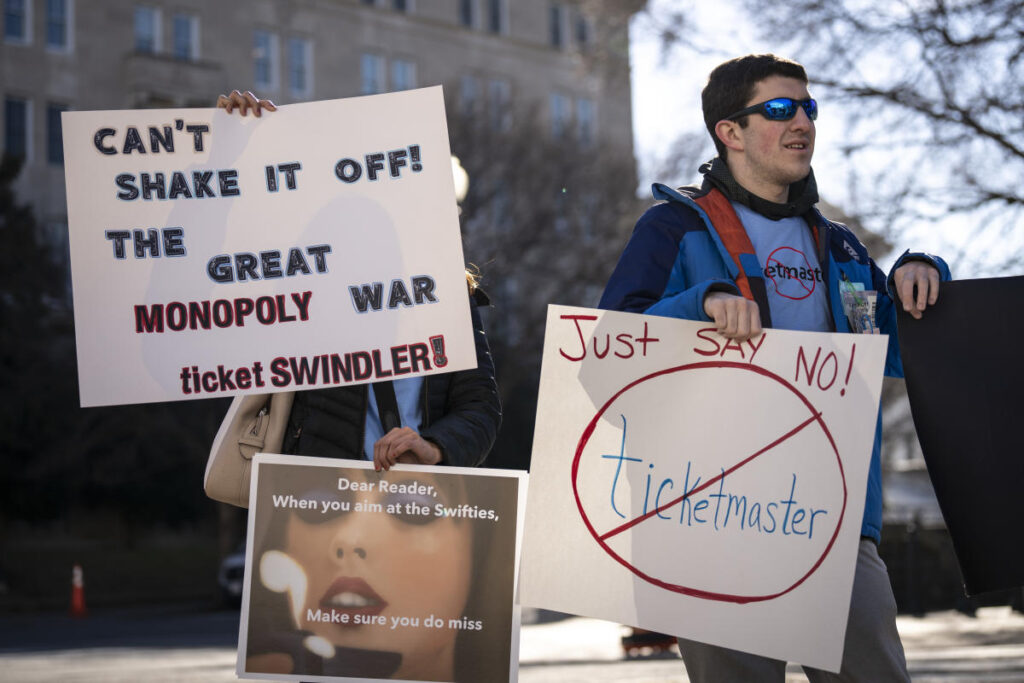The Justice Department is expanding its antitrust crackdown on Live Nation (LYV), filing a lawsuit on Thursday seeking to break up the entertainment giant.
U.S. prosecutors and state groups allege that Live Nation used Ticketmaster's ticketing monopoly to stifle competition. The lawsuit follows a two-year investigation into the company.
The lawsuit comes 14 years after the Justice Department approved the Live Nation-Ticketmaster merger. Ticketmaster is the leading provider of ticket sales throughout the United States, processing over 80% of sales. Live Nation, on the other hand, owns and operates hundreds of well-known venues and is a huge concert promoter.
The combined company has faced years of criticism from lawmakers and regulators over what they see as excessive fees, problematic customer service and unfair practices.
Live Nation's shares fell about 5% after the lawsuit was filed in the Southern District of New York.
“Live Nation has relied on illegal and anti-competitive conduct to exert its monopoly control over the U.S. live events industry at the expense of fans, artists, small promoters and venue operators,” Attorney General Merrick Garland said in a statement.
“As a result, fans will pay more, artists will have fewer concerts, small promoters will be squeezed out, and venues will have fewer substantial options for ticketing services,” he added. “The time has come to disband Live Nation.”
At a press conference after the announcement, Garland and the Justice Department alleged that Live Nation controls more than 60 percent of concert promotion.
“It's time for fans and artists to stop paying for Live Nation's monopoly,” he said.
Live Nation immediately refuted the lawsuit, calling the allegations “baseless.”
“The Department of Justice's complaint seeks to portray Live Nation and Ticketmaster as the cause of fan dissatisfaction with the live entertainment industry,” said Dan, Live Nation's executive vice president of corporate and regulatory affairs.・Mr. Wall said.
“This bill blames concert promoters and ticket sellers (neither of whom have control over ticket prices) for inflated ticket prices, while ignoring everything that actually contributes to inflated ticket prices, from increasing production costs to artist popularity to 24/7 online ticket scalping that leaves the public prepared to pay far more than the primary ticket price.”
The new legal action is part of a broader effort by the Biden administration to curb what it sees as anticompetitive behavior in a number of industries, from health care to groceries to technology.
The administration is taking to court a lawsuit brought by the Trump administration against Alphabet (GOOG, GOOGL) alleging antitrust violations by tech giants Apple (AAPL), Amazon (AMZN), and Microsoft (MSFT).
It also seeks to block mergers that could eliminate competition in other industries.
Ever since the Live Nation-Ticketmaster merger was approved in 2010, the company has been at the center of antitrust concerns, with critics denouncing inflated ticket prices and accusing the entertainment giant of anti-competitive behavior.
In 2020, the Department of Justice renewed a consent decree barring powerful venues from using Ticketmaster on Live Nation's tours, extending it through 2025.
The company said it had uncovered evidence that the company had engaged in repeated violations of the previous agreement over several years.
Meanwhile, Congress stepped up its fight against Live Nation at a Senate Judiciary Committee hearing earlier last year, following the fiasco over Taylor Swift's 2022 concert tickets.
Ticketmaster's online software struggled to handle the demand for advance orders, and fans complained they were being turned away when they tried to buy tickets.
At the time, multiple senators called for breaking up the company, but some Wall Street analysts argued that breaking up would not necessarily solve problems surrounding the unregulated secondary ticket market. Some did.
Analysts also said Live Nation would be a “demolition” without Ticketmaster, since it accounts for most of its profits.
In its latest financial report, the company's fiscal 2023 sales rose 36% from a year earlier to $22.7 billion, and earnings per share more than doubled to $1.37. More than 145 million fans have attended his more than 50,000 events, and concert attendance has increased by 20%.
Analyst Matthew Harrigan believes the DOJ's case against Live Nation is “highly politicized” in a US presidential election year, and says the department has “largely failed to apply horizontal M&A theory.”
“While we maintain that any targeted undoing of the 2010 Live Nation Ticketmaster merger is highly unlikely under the antitrust laws, we are wary of the possibility of initial venue being in New York federal court,” he said.
Meanwhile, Deutsche Bank said: “The Department of Justice's pursuit of breaking up Live Nation is somewhat surprising and increases the importance of the investigation.”
“While Live Nation is attempting to defend its position in court and we expect it may prevail, this issue is likely to remain a matter of concern for some time,” the bank added, adding that the stock price is likely to remain at issue for some time. He pointed out the possibility that it could become a burden.
For in-depth analysis of the latest stock market news and events that are moving stock prices, click here..
Read the latest financial and business news from Yahoo Finance


